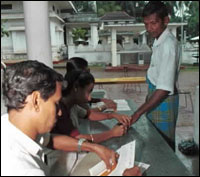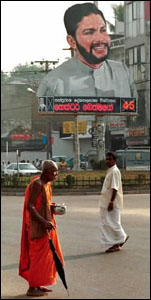
Polls predict uncertain future for government
[TamilNet, Wednesday, 07 April 1999, 23:59 GMT]
The results of the provincial council elections in Sri Lanka have left the country's ruling coalition wondering about its political future. Political uncertainty looms large in the horizon for all the main players in the island's Parliamentary elections scheduled next year.
The results of the provincial council elections in Sri Lanka have left the country's ruling coalition wondering about its political future. Political uncertainty looms large in the horizon for all the main players in the island's Parliamentary elections scheduled next year.

The PA will have to depend on Tamil support to form the administration in the three provinces of Uva, Central and Sabaragamuwa. The National Union of Workers (NUW-the banner under which the Ceylon Workers Congress and its allies contested) is expected to lend its support to the PA as the CWC is currently in the government.

The CWC and its allies, have fared very poorly despite being supported to the hilt by the PA during the election campaign. So badly that analysts doubt whether the CWC would be able to get even three seats in the next Parliament.
Currently the CWC has three MPs for the district of Nuwara Eliya, one for Kandy, one for Matale, two for Colombo and two national list MPs including its ageing leader Mr.S. Thondaman.
The CWC got 16561 in Colombo. Mr.Thondaman expressed his anger at the Tamils in the capital for voting mainly for the UNP. (The New Left Front got only a single seat in Colombo despite contesting in all the provinces due to the support of local Tamils originating from Jaffna whose support it specifically wooed) The votes the CWC got in the districts of Matale and Kandy are not enough to return an MP to Parliament in a general election.
Overall the picture does not bode well for the ruling party at all.
According to the official figures released by the Commissioner of Elections today the PA has got only 45.3 percent of the total valid votes polled in the five provinces. The UNP has taken 42.5 percent, the JVP 5.3 percent and the NUW 3.1 percent.
The JVP has emerged as a third force and is expected enhance its support base further among the Sinhalese in time for the next elections.
That this former insurrectionist leftist party has been able to secure thousands of votes in the President's family strong hold in the district of Gampaha is being noted with grave concern by ruling party circles. The JVP polled 141985 in the western province - the Sri Lankan economy's heartland - by rapidly strengthening it position among the urban and free trade zone working classes.

This growth, for a party that cherishes its insurrectionist, Marxist revolutionary past, does not bode well for business" commented a leading Tamil industrialist in Colombo.
The elections to the five provinces were considered crucial because Parliamentary elections are due next year and the Presidential elections in 2001. Hence each party, particularly the PA, treated the provincial elections as an acid test.
The PA cannot hope to dramatically improve its performance at the Parliamentary elections because;
- being the ruling party, it will face the natural decline of its support base with the passage of months.
- the JVP is expected to do better in the southern province where elections have not been held.
- the crucial Tamil vote in the northern and eastern provinces, according to most political analysts, will go against the ruling party.

The capture of Jaffna, the capture of Mankulam and other key junctions on the A9, the success of the Rana Gosa Operation, etc., have not helped the PA much in securing the majority of the Sinhala votes points out a TULF MP from the east.
(The Sinhala Maha Sammata Bhoomiputra Party, a Sinhala chauvinist group which contested in the western and North - central provinces got only 1141 votes.)
The PA will also have a tough time fighting the Presidential elections given the fact that its standing is down to 45 percent in the Sinhala areas and that the Tamils in the Northeast who voted overwhelmingly for Chandrika Kumaratunga Bandaranaike in 1994 November will oppose her this time.
"Unless the PA does something to regain the lost Tamil support soon it will have a problem" said an MP of a leftist party in the ruling alliance, pointing out that mounting economic hardships could turn more Sinhala voters against the government.
An unstable Parliament is inevitable too if the political trend set by the provincial polls were to take its natural course in the coming months say analysts.







 The PA will have to depend on Tamil support to form the administration in the three provinces of Uva, Central and Sabaragamuwa. The National Union of Workers (NUW-the banner under which the Ceylon Workers Congress and its allies contested) is expected to lend its support to the PA as the CWC is currently in the government.
The PA will have to depend on Tamil support to form the administration in the three provinces of Uva, Central and Sabaragamuwa. The National Union of Workers (NUW-the banner under which the Ceylon Workers Congress and its allies contested) is expected to lend its support to the PA as the CWC is currently in the government.  The CWC and its allies, have fared very poorly despite being supported to the hilt by the PA during the election campaign. So badly that analysts doubt whether the CWC would be able to get even three seats in the next Parliament.
The CWC and its allies, have fared very poorly despite being supported to the hilt by the PA during the election campaign. So badly that analysts doubt whether the CWC would be able to get even three seats in the next Parliament.  This growth, for a party that cherishes its insurrectionist, Marxist revolutionary past, does not bode well for business" commented a leading Tamil industrialist in Colombo.
This growth, for a party that cherishes its insurrectionist, Marxist revolutionary past, does not bode well for business" commented a leading Tamil industrialist in Colombo.  The capture of Jaffna, the capture of Mankulam and other key junctions on the A9, the success of the Rana Gosa Operation, etc., have not helped the PA much in securing the majority of the Sinhala votes points out a TULF MP from the east.
The capture of Jaffna, the capture of Mankulam and other key junctions on the A9, the success of the Rana Gosa Operation, etc., have not helped the PA much in securing the majority of the Sinhala votes points out a TULF MP from the east.